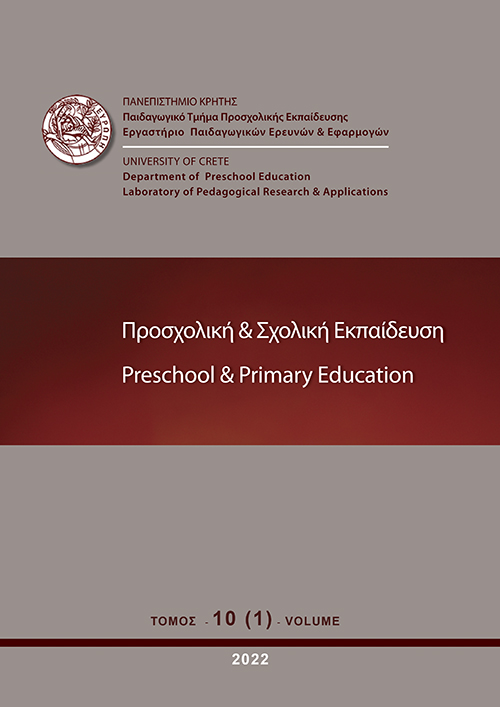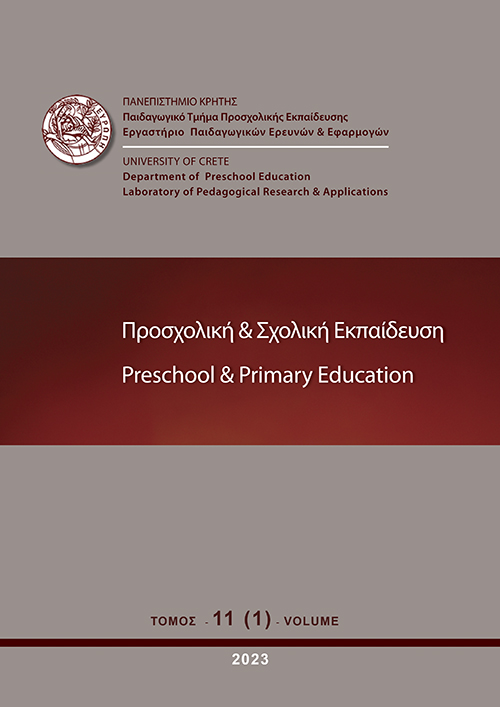Αντιλήψεις εκπαιδευτικών προσχολικής ηλικίας για τις απαιτήσεις που εγείρει ο αναστοχασμός

Resumen
Το συγκεκριμένο άρθρο μελετά τις αντιλήψεις των εκπαιδευτικών προσχολικής ηλικίας σχετικά με το ποιες απαιτήσεις εγείρει ένας επιτυχημένος αναστοχασμός. Σύμφωνα με τη βιβλιογραφία οι εκπαιδευτικοί για να αναστοχαστούν αποτελεσματικά θα πρέπει να διαθέτουν ορισμένα χαρακτηριστικά και ορισμένες ικανότητες. Συγκεκριμένα, να έχουν την ικανότητα να παρατηρούν την προβληματική κατάσταση που αντιμετωπίζουν, να την περιγράφουν, να την αναλύουν στα επιμέρους στοιχεία από τα οποία συγκροτείται και να αξιολογούν όλες τις πληροφορίες ώστε να καταλήγουν στις πιθανές λύσεις. Ακόμα, να έχει ανοιχτούς ορίζοντες, εξετάζοντας όλες τις απόψεις και τις πληροφορίες από όποια πηγή κι αν προέρχονται, να συμμετέχει ολόψυχα στην αναστοχαστική διαδικασία, να θέτει σε κρίση συνεχώς τις ενέργειες του, να αντιλαμβάνεται τις επιπτώσεις των αποφάσεων και των πράξεων του, να επιζητά τη δια βίου μάθηση και την προσωπική και επαγγελματική του εξέλιξη. Η έρευνα είχε διάρκεια τέσσερις εβδομάδες και συμμετείχαν 47 εκπαιδευτικοί προσχολικής ηλικίας που υπηρετούν σε δημόσια νηπιαγωγεία της Δυτικής Ελλάδας. Για την άντληση των δεδομένων χρησιμοποιήθηκε ένα τμήμα από ένα εβδομαδιαίο ημερολόγιο αναστοχασμού που σχεδιάστηκε στα πλαίσια διεξαγωγής διδακτορικής έρευνας. Προκειμένου να διασφαλιστεί η πληρέστερη κατανόηση του ζητήματος που εξετάζεται ακολουθήθηκε η έρευνα μεικτών μεθόδων για την ανάλυση των εμπειρικών δεδομένων. Χρησιμοποιήθηκε το λογισμικό ποιοτικής ανάλυσης NVivo-8 και το στατιστικό πακέτο SPSS. Από τα αποτελέσματα της μελέτης προέκυψε ότι όσο περνούν οι εβδομάδες συμπλήρωσης του ημερολογίου αναστοχασμού οι εκπαιδευτικοί προσχολικής ηλικίας αναφέρουν όλο και περισσότερα κριτήρια- απαιτήσεις, τα οποία εντοπίζονται στη θεωρία του Dewey ως βασικά στοιχεία στη διαδικασία του αναστοχασμού.
Article Details
- Cómo citar
-
Κοκκόση Α., Πούλου Μ., Κουστουράκης Γ., & Χανιωτάκης Ν. (2022). Αντιλήψεις εκπαιδευτικών προσχολικής ηλικίας για τις απαιτήσεις που εγείρει ο αναστοχασμός. Preschool and Primary Education, 10(1). https://doi.org/10.12681/ppej.26153
- Sección
- Άρθρα

Esta obra está bajo una licencia internacional Creative Commons Atribución-NoComercial-CompartirIgual 4.0.
Οι συγγραφείς των άρθρων που δημοσιεύονται στο ΠΡΟΣΧΟΛΙΚΗ & ΣΧΟΛΙΚΗ ΕΚΠΑΙΔΕΥΣΗ διατηρούν τα δικαιώματα πνευματικής ιδιοκτησίας επί των άρθρων τους, δίνοντας στο περιοδικό το δικαίωμα της πρώτης δημοσίευσης. Άρθρα που δημοσιεύονται στο ΠΡΟΣΧΟΛΙΚΗ & ΣΧΟΛΙΚΗ ΕΚΠΑΙΔΕΥΣΗ διατίθενται με άδεια Creative Commons 3.0 και σύμφωνα με την άδεια μπορούν να χρησιμοποιούνται ελεύθερα, με αναφορά στο/στη συγγραφέα και στην πρώτη δημοσίευση για μη κερδοσκοπικούς σκοπούς και με δικαίωμα τροποποίησης μόνον με παρόμοια διανομή (αν αναμείξετε, τροποποιήσετε, ή δημιουργήσετε πάνω στο υλικό, πρέπει να διανείμετε τις δικές σας συνεισφορές υπό την ίδια άδεια όπως και το πρωτότυπο). To Εργαστήριο Παιδαγωγικών Ερευνών και Εφαρμογών του Παιδαγωγικού Τμήματος Προσχολικής Εκπαίδευσης του Πανεπιστημίου Κρήτης και το Εθνικό Κέντρο Τεκμηρίωσης διατηρούν το δικαίωμα να δημοσιεύουν, να αναπαραγάγουν, να παρουσιάζουν στο κοινό, να διανέμουν και χρησιμοποιούν άρθρα που δημοσιεύονται στο ΠΡΟΣΧΟΛΙΚΗ & ΣΧΟΛΙΚΗ ΕΚΠΑΙΔΕΥΣΗ σε οποιοδήποτε μέσο και μορφή είτε μεμονωμένα είτε ως μέρη συλλογικών έργων, για όλο το χρόνο διάρκειας προστασίας της πνευματικής ιδιοκτησίας και για όλες τις χώρες του κόσμου. Αυτό περιλαμβάνει ενδεικτικά και όχι αποκλειστικά, το δικαίωμα δημοσίευσης των άρθρων σε τεύχη του περιοδικού ΠΡΟΣΧΟΛΙΚΗ & ΣΧΟΛΙΚΗ ΕΚΠΑΙΔΕΥΣΗ, αναπαραγωγής και διανομής μεμονωμένων αντιγράφων των άρθρων, αναπαραγωγής ολόκληρων των άρθρων σε άλλη έκδοση του Εργαστηρίου Παιδαγωγικών Ερευνών και Εφαρμογών του Παιδαγωγικού Τμήματος Προσχολικής Εκπαίδευσης του Πανεπιστημίου Κρήτης και του Εθνικού Κέντρου Τεκμηρίωσης και αναπαραγωγής και διανομής των άρθρων ή περίληψης αυτών με χρήση πληροφορικού συστήματος αποθετηρίου.



